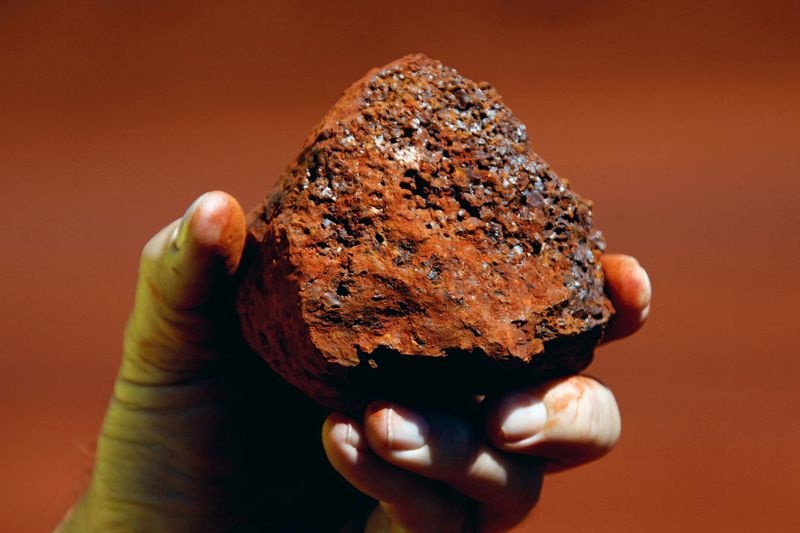© Reuters. FILE PHOTO: Labors work on a pile of iron ore at a steel factory in Tangshan in China’s Hebei Province November 3, 2015. REUTERS/Kim Kyung-Hoon/File Photo
By Amy Lv and Tony Munroe
BEIJING/SINGAPORE (Reuters) – Iron ore prices, long resilient despite China’s gloomy economic outlook, have tumbled since the end of the Lunar New Year holiday, sparking concerns around faltering demand and denting mining stocks in top producer Australia.
Prices have fallen by nearly 8% since China, the world’s biggest consumer of the key steelmaking ingredient, returned to work on Feb. 19, pressuring Australian mining stocks to four-month lows on Tuesday.
Even Beijing’s biggest-ever cut in the benchmark mortgage rate to revive the ailing property market failed to support prices, which typically get a boost from such stimulus.
The declining prices aren’t necessarily bringing much relief to steelmakers, either, as many of them are still using stocks bought at higher prices even as steel prices have dropped.
China is by far the world’s top steel producer.
“Mills depending more on seaborne cargoes may suffer deeper losses because of higher production costs as the cargoes they consume were bought when prices hovered higher,” said a central China-based steelmaker.
Ore prices had risen following the Lunar New Year holiday last year, and ended the year stronger despite weak Chinese steel demand, defying market expectations.
However, China instructing heavily indebted local governments to delay or halt some state-funded infrastructure projects has cast a fresh shadow on demand, on top of the persistent drag from the property sector.
Many mills chose to draw down inventories instead of placing new orders from the portside market as ore prices fell, according to two Chinese steelmakers and three traders.
“This year might be even harder than last year in terms of garnering profit. We will continue to maintain a low inventory of raw materials,” said a manager at a steel mill in north China.
Both steelmakers requested anonymity as they are not authorised to speak to media.
Thin margins have led steelmakers to hold off from ramping up production prior to the start of peak demand season in March, analysts said.
“Steel markets are weak and there is still little confidence in the economy,” Tomas Gutierrez, head of data at consultancy Kallanish Commodities, told Reuters.
“Beijing’s ability to engineer economic growth by traditional means is fading.”
However, despite stronger-than-usual supply in a typically slower shipment season creating headwinds for iron ore prices, several market participants said they expect prices to rebound soon as a demand recovery looms ahead, with weather increasingly favourable for construction activity.
Average daily hot metal output, a gauge of ore demand, is also likely to rise in coming weeks from its current subdued level, analysts said.
Galaxy Futures said in a note on Tuesday that steel demand may beat expectations in the first half of the year on robust manufacturing and export activity and as funds earmarked for during the fourth quarter for infrastructure spending are released.
Read the full article here

